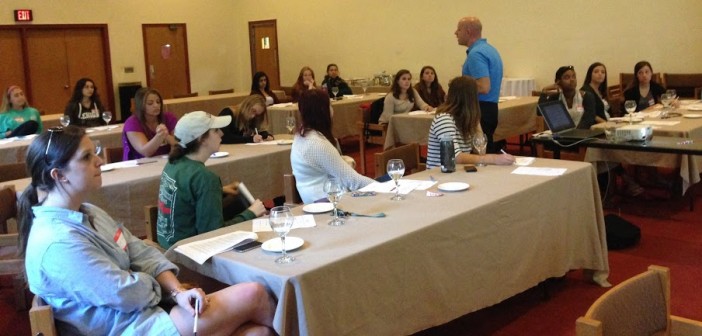The Red Watch Band movement, a program aimed to educate students on how to identify alcohol poisoning, came to Lehigh to host a bystander training session.
The program, held in collaboration by Alpha Gamma Delta sorority and the Office of Health Advancement & Prevention Strategies, entailed a two-hour interactive discussion that was moderated by the office’s director, Peter Costa.
“Toxic drinking is an epidemic on all college campuses, not just at Lehigh University,” said Rachel Sholder, ’16, a member of the office’s staff, in an email. “‘Toxic drinking’ means consuming so much alcohol that the drinker passes out. While ‘sleeping it off,’ the victim may be quietly dying.”
Costa explained to the audience that his involvement with the program is a response to having seen so many of his fraternity brothers come close to alcohol-related deaths.
“It is ineffective to tell college students not to drink,” Costa said. “We take the ‘harms reduction’ approach. Our goal is to provide students with the knowledge and skills to prevent toxic drinking deaths. We want to help students learn how to recognize an alcohol overdose and equip them with the skills to take action in the situation.”
Costa also asked the audience why each member was attending the session.
“I am here because I want to learn how to recognize the difference between a drunk person and someone having an alcohol overdose,” said Ellen Weich, ’16, president of Alpha Gamma Delta. “I want to know what to do in the situation.”
Costa also asked the audience what some signs are that someone has had too much to drink.
“People usually stumble and are clumsy,” Sholder said. “Their eyes get glazed and they slur their words.”
Costa said some signs of dangerous levels of alcohol consumption are when someone is semi-conscious and cannot be awoken, or vomits while passed out and doesn’t wake up. The person’s rate of breathing may be slow or irregular, or they may have cold, clammy, pale or bluish skin.
Costa said that at this point, a call should be made.
“The Red Watch Band does not change anything with regards to the medical amnesty policy,” Costa said. “According to the policy, students who seek medical help for another student will not be charged with violations of the University Code of Conduct provided that they cooperate with the authorities. So I urge you to call for help if a person is showing signs of an alcohol overdose because it is a medical emergency.”
Costa then took out different types of drinking glasses to show the audience how to correctly measure their drinks.
“It takes one hour for your body to process one drink,” Costa said. “If you drink more than one drink in an hour, the alcohol just keeps backing up in your body and your blood alcohol content rises and rises. One thing that I want to make clear is that BAC does not mean tolerance. Just because some students can handle alcohol better doesn’t mean that their BAC isn’t rising.”
Costa then divided the audience into groups for role-playing in certain unsafe drinking scenarios. The role-playing allowed the audience members to put themselves in realistic, dangerous drinking situations and helped them decide what course of action to take.
Costa’s hope was that the attendees would spread awareness about the program among their peers.
Students can register for Red Band Watch training sessions through Lehigh’s Office of Health Advancement & Prevention Strategies.






Comment policy
Comments posted to The Brown and White website are reviewed by a moderator before being approved. Incendiary speech or harassing language, including comments targeted at individuals, may be deemed unacceptable and not published. Spam and other soliciting will also be declined.
The Brown and White also reserves the right to not publish entirely anonymous comments.